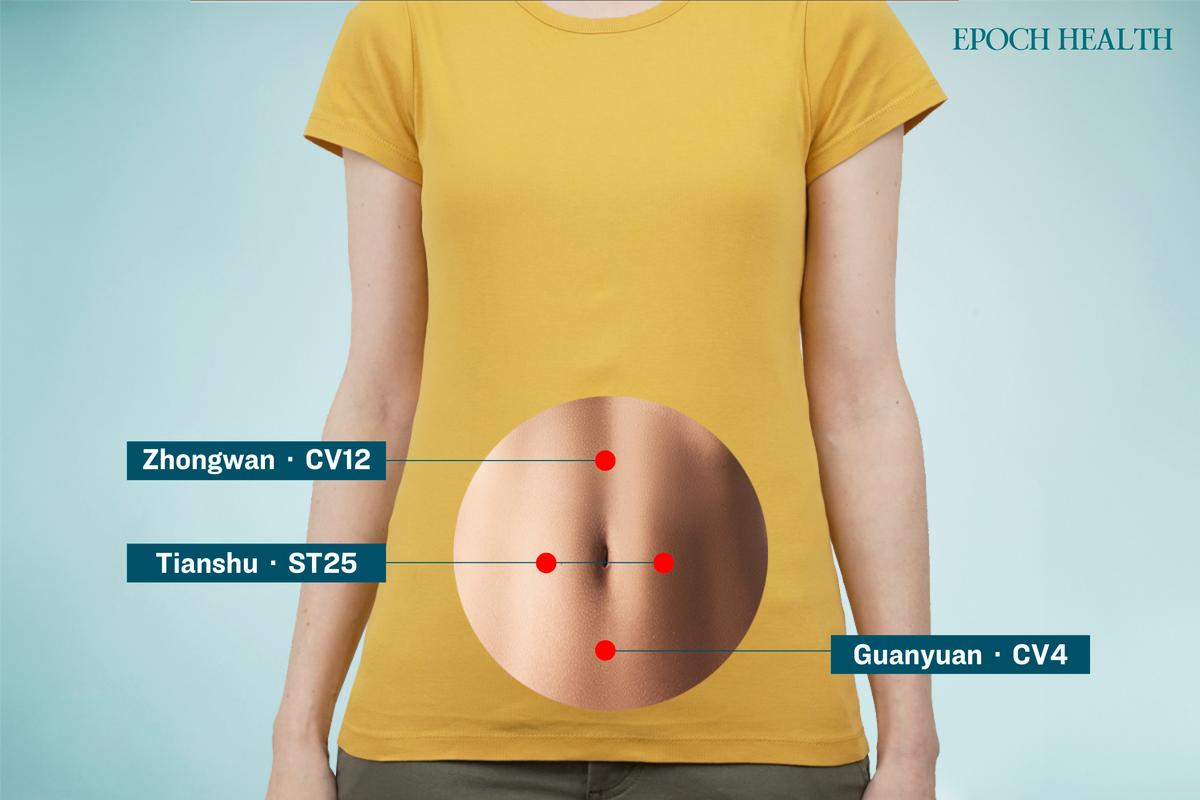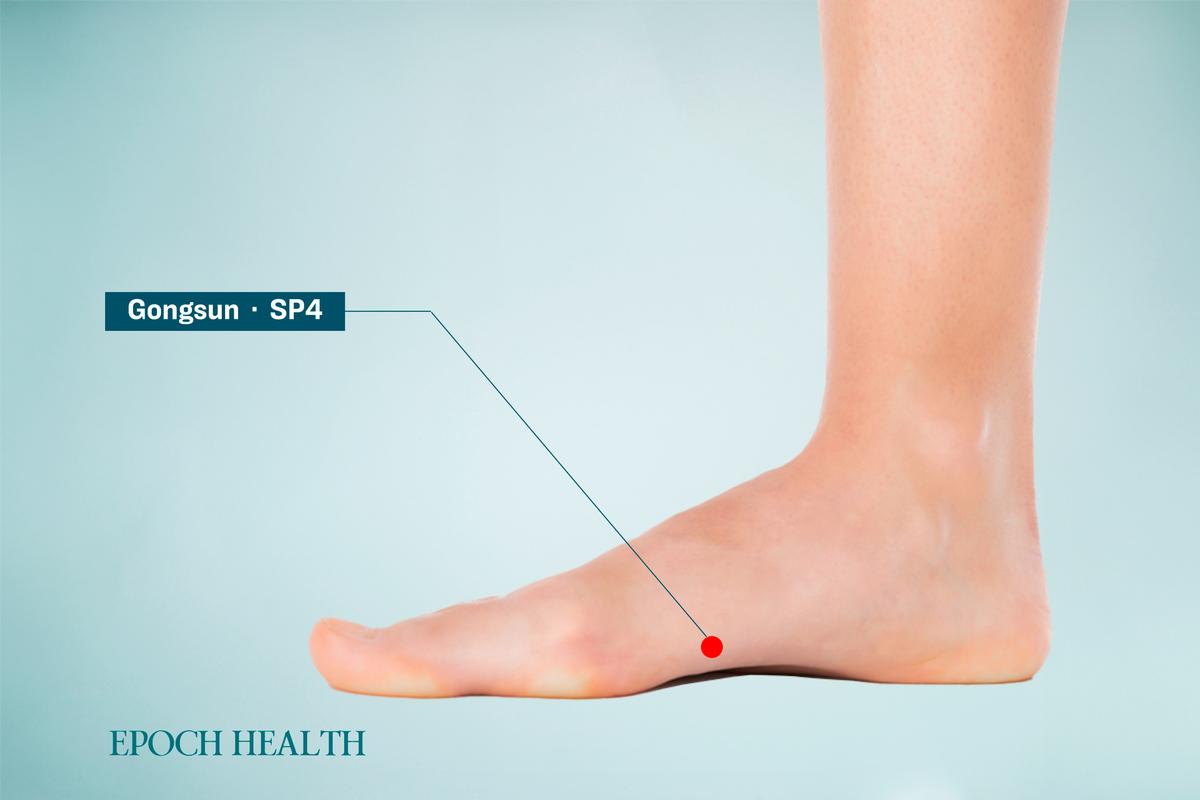
A few moments of self massage and simple teas can take the place of over-the-counter stomach medications.
Symptoms of bloating or acid reflux post-meal do not necessarily require stomach medication. A three-minute self-massage can help improve digestion and promote bowel movements.
Over-the-counter stomach medications contain ingredients such as calcium, magnesium, and aluminum. Excessive intake may lead to diarrhea and constipation, as well as an increased risk of dementia from excessive aluminum consumption. Furthermore, long-term reliance on these medications can impair the stomach’s natural functions, affecting nutrient absorption and potentially reducing physical strength. In traditional Chinese medicine (TCM), there are natural remedies that can effectively protect the gastrointestinal system.
2 Major Causes of Stomach Bloating
Bloating and burping after meals can be attributed to two major causes: poor digestion and irregular bowel movements.
Indigestion is often caused by abnormal stomach acid secretion. Eating excessively salty, oily, or sweet foods can lead to an overproduction of stomach acid. Additionally, anxiety and tension can also disrupt the balance of stomach acid secretion. Excess stomach acid can result in inflammation and ulcers in the duodenum. On the other hand, too little stomach acid can cause inflammation and ulcers in the stomach.
Dietary Adjustments: Reduce Consumption of Gas-Inducing Foods
Generally speaking, the following eight types of foods are considered triggers for bloating and acid reflux:
- High-starch foods
- Beans: Beans contain high proteins and polysaccharides that are hard to digest, which can lead to bloating.
- Dairy products: Such as milk and milk tea.
- Carbonated drinks: Such as soda and sparkling wine.
- Fried foods: Difficult to digest, fried foods tend to stay in the gut for a long time, leading to gas production.
- Sweet foods: Such as cakes, desserts, and bread.
- Raw foods: Such as lettuce and sashimi.
- Spicy foods.
Lifestyle Modifications
Lifestyle modifications can also help improve bloating and gastroesophageal reflux. Here are a few habits worth considering:
- Drink a glass of warm water in the morning upon waking up to stimulate bowel movements.
- Practice mindful eating—avoid the use of phones or other distractions.
- Chew food thoroughly and eat slowly.
- For those with gastroesophageal reflux, it is advisable to separate food and water intake—avoid soups or beverages during meals. They should be consumed one hour before or after meals.
- Avoid eating within three hours of bedtime.
- Taking a walk after meals can help promote digestion.
- When sitting or standing for extended periods, maintain good posture and take short breaks to move around every hour.
Acupressure Massage: A Natural Remedy for Stomach Issues
In traditional Chinese medicine (TCM), it is believed that the human body possesses natural healing abilities that can be activated by stimulating specific acupoints. Years of clinical practice have shown that massaging the following acupoints can help alleviate bloating and stomach discomfort, requiring only about three minutes per session.
1. Massage Zusanli and Gongsun Acupoints to Alleviate Bloating
Post-meal bloating and flatulence can be both uncomfortable and embarrassing. Massaging the Zusanli and Gongsun acupoints has been found to be highly effective in relieving bloating.
- Zusanli acupoint (ST36): Located three inches below the outer knee, in a depression on the front side of the shinbone. Massaging this acupoint can improve digestion and warm the stomach and intestines.
- Gongsun acupoint (SP4): Located below and in front of the inner ankle, in a depression one inch behind the base of the big toe.
When locating acupoints, it is common to use one’s own fingers for measurement. One inch is equivalent to the width of the first joint of the thumb, and three inches is the width when the other four fingers are held together.
One study found that stimulating the Zusanli acupoint with electroacupuncture can regulate the metabolic functions of the stomach and heart, serving as an alternative therapy for treating gastric and heart diseases. Another study showed that stimulating the Gongsun acupoint can improve the mood and gastrointestinal motility of rats with functional dyspepsia.
2. Massage Abdominal Acupoints for Better Digestion and Bowel Movements
Massaging acupoints on the abdomen after meals can promote intestinal peristalsis and help with bowel movements:
- Zhongwan acupoint (CV12): Located four inches above the navel.
- Tianshu acupoint (ST25): Located two inches to the left and right of the navel, totaling two points.
- Guanyuan acupoint (CV4): Located four inches below the navel.
Method: Massage the abdomen clockwise, focusing on the four acupoints mentioned above, 30 minutes to one hour after meals.
 |
| The locations of Zhongwan, Tianshu, and Guanyuan acupoints. (The Epoch Times) |
Research has found that frequent application of acupuncture on Zusanli, Zhongwan, Tianshu, and Guanyuan acupoints can effectively treat opioid-induced constipation in cancer patients. It can protect the gastrointestinal tract and promote bowel movements.
2 Beneficial Teas for Digestive Health
Traditional Chinese medicine natural remedies for improving digestive health also include teas:
1. Sanxian Tea
People experiencing abdominal bloating may consider drinking Sanxian tea—a traditional herbal tea made from hawthorn, Shen Qu (medicated leaven), and malt. These three medicinal ingredients are generally available in Asian grocery stores.
Preparation:
- Place 0.07 ounces (two grams) each of dried hawthorn, Shen Qu, and malt in a mug.
- Pour hot water, steep for 15 minutes, and then it is ready to drink.
Hawthorn is a traditional Chinese medicine often used to treat indigestion caused by high-calorie diets. One study indicated that hawthorn can regulate the gut-brain axis and improve gut microbiome imbalance.
2. Hawthorn Malt Tea
According to TCM, the spleen and stomach are part of the same energy system. When these organs are invaded by cold, it can result in indigestion, along with symptoms such as cold extremities, a chilly lower abdomen, a pale complexion, and frequent abdominal pain.
Children with spleen deficiency (insufficient energy in the digestive system) are prone to the aforementioned symptoms and may have poor appetite. Drinking hawthorn malt tea may alleviate these symptoms. The preparation is similar to Sanxian tea:
Steep 0.07 ounces (two grams) each of dried hawthorn and malt, in hot water for 15 minutes, then drink.
Hawthorn can aid in digestion and resolve stagnation, promote blood circulation, and dispel stasis. Similarly, malt can aid in digestion, stimulate the appetite, and regulate the spleen and stomach.
Fruits and Vegetables for Reducing Bloating
Extensive clinical practice has demonstrated the effectiveness of white radish in reducing bloating. It promotes the flow of qi (energy) in the body, acts as a diuretic, and facilitates bowel movements.
Among fruits, papaya and kiwi are top choices for reducing bloating. Notably, papaya contains enzymes that aid in protein digestion. A randomized controlled trial showed that eating two green kiwis per day can increase bowel movements, alleviate constipation, and improve abdominal comfort.
Natural remedies can be used to improve gastrointestinal health. However, it is important to note that diet and therapies may vary depending on the individual. Please consult with a health care professional for a specific treatment plan.
Important Notice: This article was originally published at www.theepochtimes.com by Naiwen Hu where all credits are due.
Disclaimer
The watching, interacting, and participation of any kind with anything on this page does not constitute or initiate a doctor-patient relationship with Veripeudic.com. None of the statements here have been evaluated by the Food and Drug Administration (FDA). The products of Veripeudic.com are not intended to diagnose, treat, cure, or prevent any disease. The information being provided should only be considered for education and entertainment purposes only. If you feel that anything you see or hear may be of value to you on this page or on any other medium of any kind associated with, showing, or quoting anything relating to Veripeudic.com in any way at any time, you are encouraged to and agree to consult with a licensed healthcare professional in your area to discuss it. If you feel that you’re having a healthcare emergency, seek medical attention immediately. The views expressed here are simply either the views and opinions of Veripeudic.com or others appearing and are protected under the first amendment.
Veripeudic.com promotes evidence-based natural approaches to health, which means integrating her individual scientific and clinical expertise with the best available external clinical evidence from systematic research. By individual clinical expertise, I refer to the proficiency and judgment that individual clinicians acquire through clinical experience and clinical practice.
Veripeudic.com does not make any representation or warranties with respect to the accuracy, applicability, fitness, or completeness of any multimedia content provided. Veripeudic.com does not warrant the performance, effectiveness, or applicability of any sites listed, linked, or referenced to, in, or by any multimedia content.
To be clear, the multimedia content is not intended to be a substitute for professional medical advice, diagnosis, or treatment. Always seek the advice of your physician or other qualified health providers with any questions you may have regarding a medical condition. Never disregard professional medical advice or delay in seeking it because of something you have read or seen in any website, video, image, or media of any kind. Veripeudic.com hereby disclaims any and all liability to any party for any direct, indirect, implied, punitive, special, incidental, or other consequential damages arising directly or indirectly from any use of the content, which is provided as is, and without warranties.



